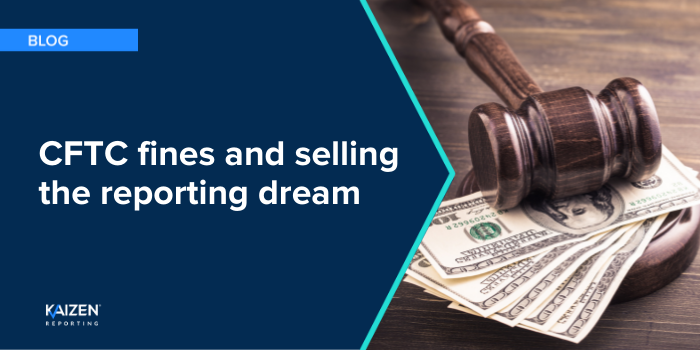CFTC fines and selling the reporting dream

Anyone that’s worked with me or read more than a couple of my ramblings will know that I don’t do sales.
I’m not being boastful or even modest. It’s just not my forte so I tend to give anything ‘salesy’ a wide berth. I mean no disrespect to the world of selling or the talented people that work in sales. I’m just so bad at it and so far out of my comfort zone that I’d probably give the product away for free rather than get into discussing the dreaded commercials.
Breaking my rule
The third quarter of 2021 or more specifically the last four days of September saw a flurry of enforcement actions and fines from the CFTC, that after some careful consideration are leading to me breaking my nothing-salesy rule. Not because I’ve had a change of heart or want to move in a different direction. But the themes within the CFTC enforcement actions are so closely aligned to what we do here at Kaizen Reporting it’s almost impossible to not go there.
So kindly bear with me whilst I set out the stall.
Taking back controls
I always advise clients of the importance of devoting a significant effort to building controls into their reporting systems as well as layering additional controls onto the reporting systems and the reporting data generated. Over the last few years I’ve seen an interesting trend where many firms are moving those controls further up the stack towards the trading systems rather than downstream in the data lake or reporting hub. The ethos being that it’s better to flag the errors at source rather than further downstream where the remediation workflow can be more elaborate, involve multiple systems and take longer.
I stand by this advice and maintain that it’s not only best practice but it’s absolutely crucial to help detect and prevent errors within your reporting.
Marking your own homework
However there is a key limitation which means that these controls, no matter how well designed and implemented are not enough. Simply put, at some stage you inevitably end up marking your own homework. Whether the controls were developed at the same time the reporting system being built or were added later, the vast majority of the time it was the same teams, relying on the same documentation and same interpretations that ended up owning both the reporting and the controls.
[First salesy spoiler alert]. Independent controls and that unbiased second opinion are key to detecting the issues that your controls and vigilance missed.
I could labour the point but there’s no need as it’s really that simple.
[Second salesy spoiler alert]. At Kaizen we offer the best in class data Accuracy Testing (checking the integrity of the reported data), Reconciliations (testing the completeness and accuracy of the reported data versus your source systems) and Reference Data Testing (testing the accuracy of the reference data that your reporting systems utilise to do the reporting). We offer these because it’s our experience of working with many, many clients over many different regulatory regimes that this is what is needed to fully assess the quality of the reporting data.
We’ve seen it many times over the years in various regulations where an upstream reference data change causes an unforeseen reporting issue downstream. Your own controls might catch such instances, but they also might not. A static data change results in a different value flowing downstream to the reporting system. The value goes out the door and is reported because it’s a valid value, but it’s the wrong valid value.
CFTC enforcement actions
Looking at the themes in the recent CFTC enforcement actions will hopefully shine a light on why I’m breaking my embargo.
- Failure to report LEIs or report the correct LEIs
Accuracy Testing, Reference Data Testing and Reconciliations.
- Failure to report swap valuation data or accurate valuations to an SDR
Accuracy Testing and Reconciliations.
- Reporting inaccurate swap data to an SDR.
Accuracy Testing, Reference Data Testing and Reconciliations.
As a firm that spends its entire energies and focus on the world of trade and transaction reporting we know more than most just how challenging these ever changing regulations can be. [Third and final salesy spoiler alert]. That’s why Kaizen Reporting was founded – to help firms with exactly these challenges.
The recent CFTC enforcement actions prove that the US regulator is paying close attention and expects the swap data to be reported accurately. With better and more prescriptive data standards coming in the form of the CFTC ReWrite we can only expect their tolerance of reporting issues to decline even further. The CFTC have spent years and a lot of effort on the ReWrite and they are going to expect high quality data reported from the start.
- For a conversation with Alan or one of our regulatory specialists about the above topics, please contact us.


